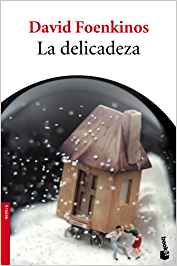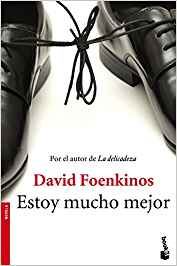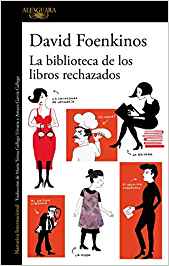The best of the new great writers like David Foenkinos, which burst forth with force without being carried away by trends and throwing themselves headlong into the avant-garde, is that they are ultimately unclassifiable. Critics and the industry in general seek accommodation for that new voice that many readers talk about with that, for them, uncomfortable life of its own and independent of general labeling. The voice of the reader who discovers something new and surprising.
In current French literature for me, two authors stand out with that label of the unpredictable who approach the literary from the essentially vital on two sides as distant as they are complementary. One of them is Foenkinos himself, committed to the lyrical, to sublimated reality, to resilience.
The other is Michel Houellebecq, disturbing and deep into the abysses of the soul of the current human being. Between these two authors we find a whole creative range with that touch of passion that the first great French writers of modernity already pointed out: Alexandre Dumas y Victor Hugo.
So ask us about Foenkinos style it is to throw our doubts at that vanguard whose objective is always determined with the passage of time. Because Foenkinos writes about love, he brushes with a quick stroke on his characters and yet he manages to make that narrative impressionism catch on to the spectating readers.
Perhaps we could speak of literature as existential voyeurism, of an intention to approach the everyday, the magical and the tragic of living, with the usual implosions that upset everything. An adventure with that one-way trip that is living.
Top 3 recommended books by David Foenkinos
The delicacy
Without marking that insurmountable milestone, this novel was the most unanimous recognition in most of the world.
If we consider that a tragic story aims more at medianeity than great success, Foenkinos' ability to end up narrating a story of extremely powerful scope is due to its lyrical imprint that manages to move between the tragic as a melancholic melody that nevertheless points towards a change of course that as readers we yearn for, we sense and that invites us to continue reading, expecting that poetic justice that finally surprises us with virulence, like a burst of color in a Paris turned into an accomplice.
A Manichaean game that presents the city as the space that can devour you in its most alienating visualization but that ultimately surprises in its potential crossings that, once prompted by fate, can end up making you stronger.
Nathalie's story points to that pain for the most unexpected loss to transform little by little, thanks to those delicate and precise brushstrokes, in a return to magic that can only be reached from the bottom of existence.
The Martin family
As much as it disguises itself as a routine history, we already know that the David Foenkinos It is not going into manners or inter-family relationships in search of secrets or dark sides. Because the already world-renowned French author is more of a surgeon of letters in form and substance. Everything is dissected on the operating table, ready to analyze the focus of the tumor or humor as a fluid from which joy flows.
And is that since I write, Foenkinos is kundera with latex gloves, ready to narrate with the most precise asepsis what life shows to each new layer of skin or organic level or viscera if it touches. And it turns out that it convinces us that yes, that is life, a cyclical molecular repetition in which each character that lives in that life, made a book or ours, is a bit of ourselves.
Empathy is not magic, it is "only" about having the gift of writing transcending one's own history. And the point is that the protagonist of this book may be Foenkinos whispering into the other author's ear each new scene that occurs between improvisation and that script point that we all seem to intuit in the basting of our days.
A writer immersed in a creative block decides to carry out a desperate action: the subject of his next novel will be the life of the first person he meets on the street. This is how Madeleine Tricot enters his life, a charming old woman willing to tell him about her secrets and wounds: of marriage and widowhood, of her work as a seamstress for Chanel during Karl Lagerfeld's golden age, of the disparate relationship with her two daughters.
Valérie, the oldest of them and who lives in the same neighborhood, doubts the intentions of this writer, but decides that it could be good therapy for her mother. And not only that: in order for her to continue with her task, she demands that the writer include her in the story she is sketching, as well as all the members of her family, the Martin family, traversed by both love and love. exhaustion from routine. Little by little the threads of all these stories are entangled in a skein of memories, longings, resentments, emotions that seemed lost and others that, hopefully, can be recovered.
I am much better
A surprising novel about the somatization of life itself. Let me explain, Foenkinos transforms the old conception of the wounds of the soul that are traced with the passage of time, guilt, lost opportunities, losses and the rest of setbacks into a back pain that ends up blocking it and for which no doctor finds its cure.
Back pain as a metaphor for the weight of mistakes and failures ends up decomposing his current life. Everything is going to waste, from work to family.
But in a way, maybe that's what that back pain is looking for. Pain is a message, the typical warning of the critical age in which everyone discovers that not everything done was what they wanted.
Once at the bottom of the well, the protagonist will find the necessary time to try to alleviate a pain that he already sees directly associated with the mistakes of his life. His parents, his first love, the loss of his youthful reference John Lennon, a sum of moments that were linked at the time and that now press hard on his back.
Where medicine cannot reach, the patient himself must take care of finding his placebo, the best remedy to undo all kinds of knots ...
Other interesting books by David Foenkinos ...
Number two
The second is the worst loser of all, without a doubt. At a sporting level it can end up being a lever effect, but in the vital it is something like the used lover, the discarded job or the one who waits for the eternal opportunity that does not come. There was only one Harry Potter, the other continued to be the usual bespectacled boy.
In 1999, hundreds of young people auditioned to play Harry Potter. Among the two candidates who made it to the end, Daniel Radcliffe was chosen for having, according to the casting director, "that something extra". Reading these statements, David Foenkinos immediately empathized with the guy who didn't have that extra touch: number two. This novel tells his story.
The life of Martin Hill, a boy with divorced parents and round black glasses, takes a turn when he randomly goes to the London production company where his father works on the same day that David Heyman passes by, immersed in the search for the actor who will play the little wizard.
After being discarded, Martin will fall into successive depressions with each new installment of the books and movies. Around him, everything reminds him of the success of his rival and little by little, instead of enjoying Radcliffe's life, his own life begins to resemble that of the tormented fictional character. Can he overcome that stain on his destiny and turn failure into a strength?
The library of rejected books
Not infrequently we hear it said that writers write, above all, for themselves. And surely there is part of reason in that assertion. It could not be otherwise for a job, a dedication, which entails hours of loneliness and downtime in the surrounding reality, when the author is absent to pose one and a hundred times the scenarios that make up a novel.
But… wouldn't it be more appropriate to say that an author writes, above all, for himself, if that writer were capable of writing a masterpiece and keeping it hidden from the general public?
This book The library of rejected books It raises this situation, it takes us away from the finalist ego of the author who wants to be read, in order to harbor that romantic idea of the writer who writes for himself, solely and exclusively.
The novel tells us about Henri Pick, who in light of his unpublished work The last hours of a love story, may have been a great author of his time. However, no one ever knew of his fondness for writing, not even his widow.The story takes place in Crozon, a remote French town of just over 7.000 inhabitants, whose geographical location harmonizes with that idea of the author isolated from the great spaces cultural recognition and glory. In that town, a librarian collects unpublished works, including Pick's novel.
When a young editor discovers it and relaunches it to the world, its quality and particular circumstances make it a bestseller. But the seed of doubt always appears. Could it all be a business strategy? Is everything that is presented about the work and its author true?
The reader will move along these unpredictable paths, between skepticism and confidence that Henri Pick could have existed, as the world has come to know him.






It leaves you with that bittersweet taste that so many people like because it is like your own life and you decide that Literature has done magic and you plan to move on